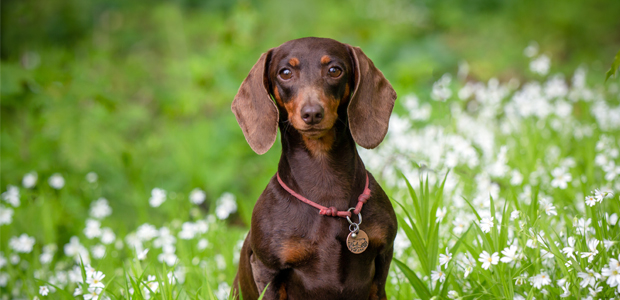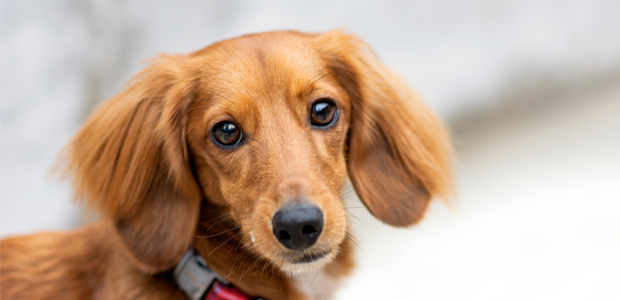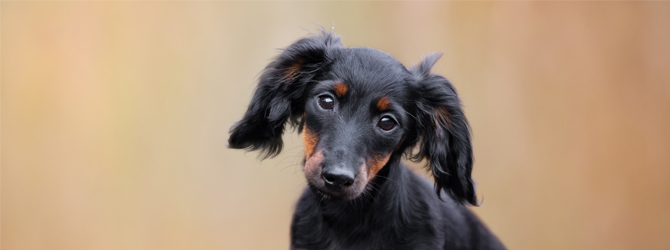The Miniature Dachshund: is it the right breed for you?
Miniature dachshunds, sometimes known as sausage dogs or wiener dogs, are loyal companions and good watchdogs. Smaller than a standard dachshund, they are surprisingly active dogs.
Dachshunds are scent hounds that were originally bred to hunt badgers and other burrowing animals, such as foxes and rabbits. They are good with children and their small size makes them ideal pets if you live in a smaller house or a flat.
Miniature Dachshund Summary:
- Dachshunds were originally used to hunt badgers and rabbits
- Coat types include smooth hair, long-haired, and wire-haired varieties
- Common colours include chocolate, tan, blue, black & tan
- Miniature Dachshund life expectancy = 12 - 15 years
- Average size = 15 - 20 cm
- Average weight = 4 – 5 kg
- Estimated monthly cost = Medium
- Exercise needs = Low
- Attention needs = High
- Sociability = Medium
Please note: A dog’s exercise, training/stimulation and grooming requirements can depend on several factors such as age and health. The same goes for ongoing costs of ownership. For advice on one specific dog, we always advise chatting with a vet.
How much exercise do miniature dachshunds need?
Your miniature Dachshund will need between 30-45 minutes of exercise per day. They’ve got a lot of energy for a small breed so you can split this into two walks to tire them out.
To keep them happy and healthy, take them to a secure environment where they can run off-lead, with lots of interesting things to see and sniff. Try to keep jumping to a minimum and keep an eye out for streams, holes and dips, as dachshunds can easily damage their backs.
Miniature dachshund dietary needs
Your dachshund will need a balanced diet rich in nutrients, vitamins, and minerals. It’s best to feed them complete dog food specially formulated for small breeds to ensure that they are getting the right amount of vitamins and nutrients.
Growing pups may prefer 3-4 smaller servings during the day, rather than two larger meals. This can be reduced to two meals a day as your dog gets older.
The recommended portion size will depend on your individual dog. You’ll need to take into account their activity level, age and metabolism. To avoid weight gain, make sure your miniature dachshund has a healthy and balanced diet and gets plenty of exercise.
For dietary advice that’s specific to your dog, have a chat with your local vet or the breeder you’re purchasing your puppy from.

Training: how to train a miniature dachshund
Miniature dachshunds are known for their quirky personalities and so training can require a lot of patience. Dachshunds respond well to positive feedback and rewards. The breed has a fairly strong prey drive and can lose interest quite easily if they see or smell something they think is more interesting.
Miniature dachshunds are a social breed and enjoy human interaction and playing with other dogs. They will benefit from socialising from an early age and attending puppy socialization classes.
As is the case with all breeds, miniature dachshunds will start to approach new experiences with caution when they are around 12 weeks old. Therefore it’s really important for their development that they experience as many different situations as possible.
Whilst they are still so young and receptive, it's a good idea to introduce your dachshund to other dogs, people and livestock as well as car travel and unfamiliar noises, such as traffic.
Affection dogs who love cuddling and human interaction, dachshunds can be prone to developing separation anxiety. It’s good practice to leave them on their own for small periods during training so that they can get used to being by themselves.
Grooming: do miniature dachshunds shed?
Miniature dachshunds don’t moult that much and will only moderately shed their hair. Generally speaking, their coats are easy enough to keep in tip-top condition – 1 brush per week should do the trick, and you’ll only need to bathe your dachshunds if they get really muddy.
Long haired varieties require slightly more regular maintenance than their short haired counterparts. Complete your miniature dachshunds grooming routine with regular tooth brushing, nail clips and ear checks.
Cost of owning a miniature dachshund
When considering the lifetime cost of owning a miniature dachshund, remember to take into account the following costs:
- Dachshund food and diet
- Veterinary care
- Pet insurance
- Kennels or dog sitters
- Regular canine grooming costs
- Dog toys and equipment
Are miniature dachshunds prone to any health problems?
Miniature dachshunds are prone to certain health problems, just like all breeds. This doesn’t mean your dog is guaranteed to contract any particular disease – it’s just something to bear in mind. Because of their short legs, they are prone to developing back problems.
To keep your miniature dachshund as healthy as possible, monitor them closely and attend routine 6-month health checks with your vet. This will allow the vet to give your dog a thorough check-up and to pick up on minor (often symptomless) conditions before they have a chance to escalate into something worse.
Possible health complications for miniature dachshunds include:
- Dental issues and gum disease
- Infections
- Canine obesity
- Allergies (including fleas food and pollen)
- Eye problems
- Intervertebral Disc Disease (a condition that affects the dog’s back)
- Hip dysplasia
Before welcoming a new dog into your household, make sure you’re able to cover the costs of any routine or emergency medical treatment they may need. Pet insurance will help massively with this. Why not ask your vet about their recommended pet insurance policy?

Miniature dachshund temperament, socialising and ideal home environment
Miniature dachshunds make for great family pets and are known for their curious nature and sense of humour. They love human interaction and like to be doted on.
Dachshunds usually get on well with other pets if they are introduced to them from a young age. They can have a loud bark and their origins in tunnelling for rabbits and foxes can lead to them digging holes.
If you’re looking for a fun and entertaining pooch who loves cuddles and is loyal to his family, a miniature dachshund might just be the dog for you!
Are miniature dachshunds suitable for first time owners?
If you don’t have any previous experience in owning a miniature dachshund, some of their traits and behaviours might be worth taking into consideration before you take the plunge.
If you aren’t going to be at home for long periods of time and you don’t have a lot of time to spend socialising with other dogs, there’s a good chance that you dachshund won’t have the opportunity to become a well-adjusted adult.
Without proper training, the dachshund’s protective nature can lead to excessive suspicion of unfamiliar people and dogs.
They are also prone to developing spinal and joint problems, so be prepared to cover the cost of veterinary care should they develop health problems.
Need more info?
For more info on finding the best dog breed for you and your lifestyle, have a chat with your vet. Find your nearest vet using our Find a Vet page, or speak to a vet online using Online Vets.

